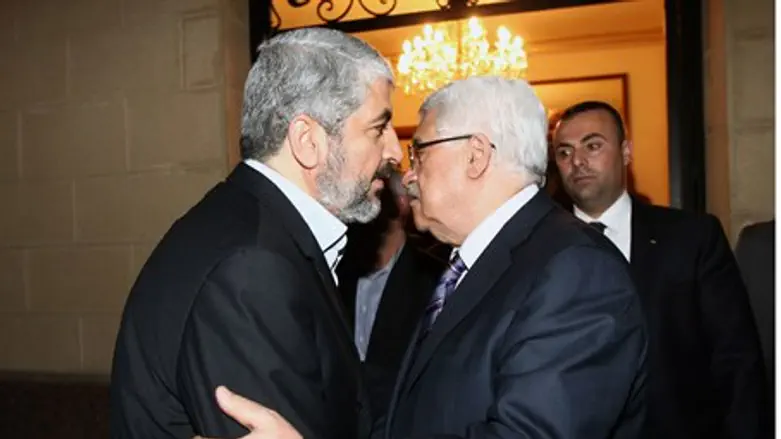
A US-brokered renewal of Middle East peace talks, being mulled by Fatah but rejected outright by Hamas, could seriously hinder "reconciliation" talks between the two groups, according to AFP
Palestinian Authority president Mahmud Abbas's Fatah party, based in Judea and Samaria,and Gaza's Islamist rulers have been at odds since Hamas's takeover of theStrip in 2007, but since signing an Egypt-brokered reconciliation deal in 2011have been attempting to heal their rifts.
Abbas's agreement in principle on Friday to resume peace talks with Israel after a three-year hiatus met with an angry reaction from Hamas, who's charter calls for the genocide of the Jewish people.
"This could deepen the rift between the Palestinians and hinder reconciliation," said Walid al-Mudallal, politics and history professor at the Islamic University in Gaza.
"It's just not possible to talk about reconciliation while one side rejects the decisions of the other on peace talks and the Palestinian future."
US Secretary of State John Kerry announced on Friday that Palestinian Authority andIsraeli leaders had agreed in principle to resume peace talks, with apreliminary meeting possible within a week.
Hamas quickly fired off a salvo, saying Abbas did not represent the will ofthe Palestinian people, who "will not accept this."
Mudallal warned of a "new impasse which will deepen Palestinian division,because the talks will take place without consulting anyone else (other thanFatah)".
Samir Awad, a political science professor at Birzeit University in Judea and Samaria, agreed.
"Returning to talks with Israel would place serious obstacles on the path to reconciliation and I'm not sure there will even be a place for reconciliation," he said.
"Israel will become a more important (negative) factor in the internalPalestinian situation after the talks restart."
Adnan Abu Amer, politics professor at Ummah University in Gaza, said that for any peace talks to succeed the Hamas-Fatah reconciliation process would by necessity have to stop.
"With the start of negotiations, reconciliation must stop, because if itgoes ahead (Hamas becomes allied with Fatah), itwould be too difficult" for the talks to succeed, he said.
The Egyptian factor
But Abu Amer said that peace talks with Israel were not the onlydevelopments stalling efforts at Palestinian unity.
"Reconciliation will in any case remain frozen until Egypt solves itsdomestic problems," he said.
Egypt, which has been a key broker in the past of talks between Hamas and Fatah, is in a political crisis after its army ousted Islamist president Mohammed Morsi, a senior figure in Hamas' ally the Muslim Brotherhood.
Hamas and Fatah signed an Egypt-brokered reconciliation deal in Cairo in2011, pledging to set up an interim consensus government of independents thatwould pave the way for parliamentary and presidential elections within 12months.
But implementation of the accord stalled over the make-up of the interim government, and a February 2012 deal intended to overcome outstanding differences was opposed by Hamas members in Gaza.
Mudallal agreed that "reconciliation will be delayed considerably, alsogiven Egypt's important role as guardian of the inter-Palestinian process".
Political analyst Hani Habib disagreed, however, that external factorswould make or break Palestinian reconciliation.
"Peace talks will have absolutely no effect on Palestinian reconciliation,because the issue is in essence an internal one," he said.
"The lack of reconciliation so far is because of a lack of willingness fromthe Palestinian sides in the first place."
Hamas refuses to recognise Ramallah-based PA prime minister Rami Hamdallah, instead recognising its own Ismail Haniya as premier, and had long opposed Hamdallah's predecessor Salam Fayyad - an issue some commentators have said was a crucial obstacle to making peace.
But Hamas's position on talks with Israel is clear.
Haniya, head of the government in Gaza, on Friday implored Abbas: "We ask brothers in the Palestinian Authority... not to fall yet again into the trap of talks."
Abbas must "build a Palestinian strategy based on reinstating unity and ending division -- building a solid and resistant Palestinian entity" before any decision to talk with Israel is taken, he said.